Research

Our research interests are rather broad, covering both basic and applied problems in agricultural and natural ecosystems. We are very interested in how plant-herbivore interactions are influenced by anthropogenic pollution of air (ozone, acidic precipitation) and water (metals and metalloids). As part of this work, we are investigating how increasing CO2 levels impact plant physiology, and how any resulting chemical or growth changes may impact insect development and behavior. We are also interested in how elevated atmospheric CO2 will change gene expression, and toxin production, in genetically modified plants. In celery, we have devoted considerable time to studying the environmental and genetic factors inducing production of the carcinogenic and mutagenic linear furanocoumarins. Understanding why air pollutants, some pesticides, and some insects induce production will enable us to better avoid undesirably high levels of these compounds in commercial production.
These studies on plant physiology have stimulated additional interests in how and when plants can compensate for insect damage. Although initially of a basic physiological nature, most of this work ultimately will have practical application in economic threshold development and ecosystem management.
In more applied studies, we have projects on IPM in vegetables, including plant resistance studies and research designed to develop economically viable strategies for using viruses, pheromones, and new isolates of Bacillus thuringiensis in commercial production. We recently completed a large project in Mexico on tomato IPM, and a related project is underway in the U.S. As an offshoot from this work, we are investigating relationships between various Liriomyza species/populations in an attempt to understand why the dramatic species fluctuations in these leaf mining flies are occurring throughout the world.
Finally, we have an interest in finding new materials from natural sources of interest in pest management. Recently, we documented the antifeedant and toxicant effects of a series of novel avocadofurans. Subsequent studies have compared of growth inhibitory and insecticidal activity responses to side chain lengths, presence of double bonds and tetrahydrofuran analogs.
Pollution, Plant Compensation, and Herbivory: We are very interested in how plant-herbivore interactions are influenced by anthropogenic pollution of air (ozone, acidic precipitation) and water (metals and metalloids).
Click to view a brief slide show.
Agricultural studies: Over the past 25 years our lab has worked with the tomato, celery, and pepper commodity boards to develop economically viable IPM programs focused on large and small scale commercial grower operations in several countries. This applied research includes studies of insect behavior, distribution, plant resistance, and strategies for using viruses, pheromones, and new isolates of Bacillus thuringiensis.
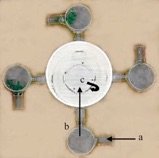
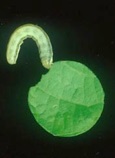
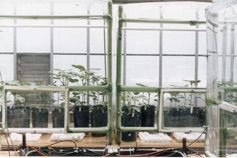
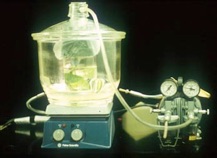
Olfactometer design for attractiveness assays
Infusing Bacillus thuringiensis into plants
Greenhouse studies of CO2 effects on toxin expression in transgenic cotton
S.exigua choice test
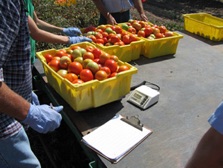
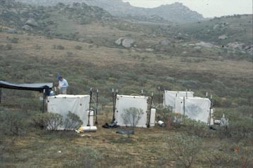
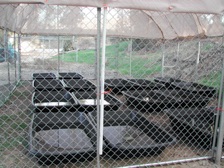
Studies on economics of IPM in tomato production
Acidic fog studies on Encelia species
Microcosm studies on metal and metalloid pollution effects on the food web
Entomology


